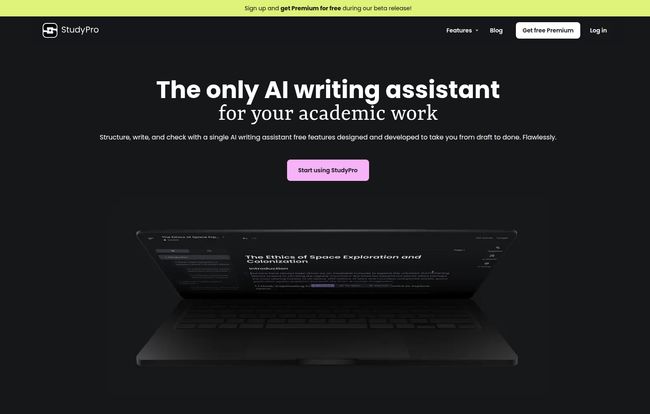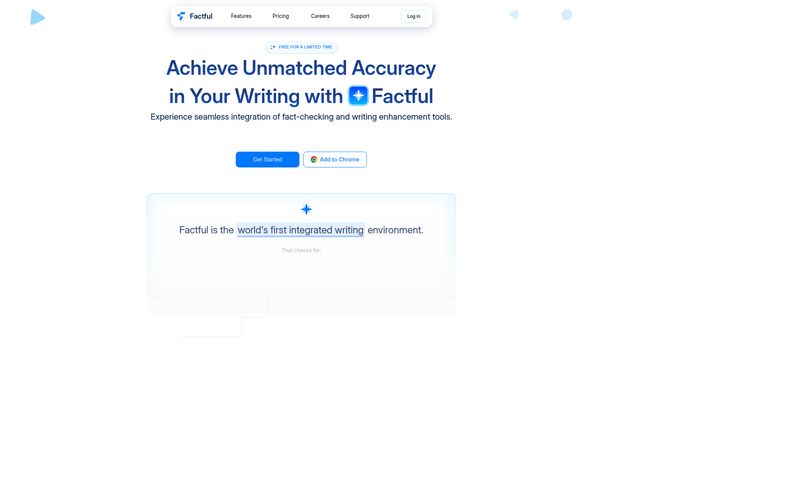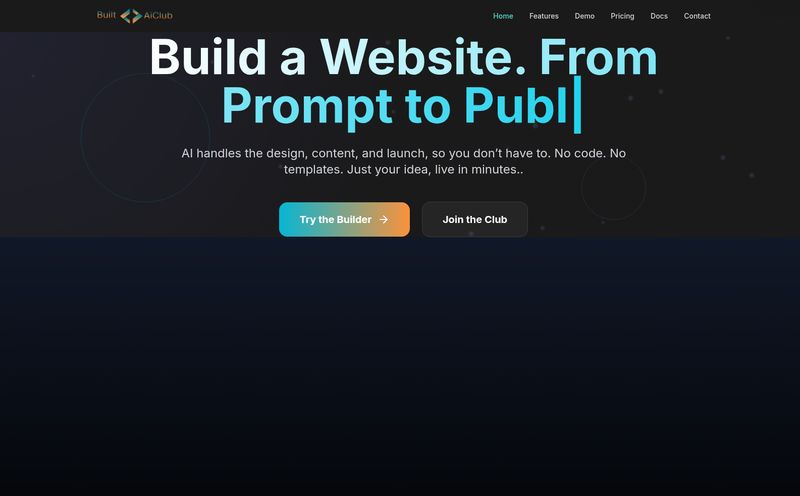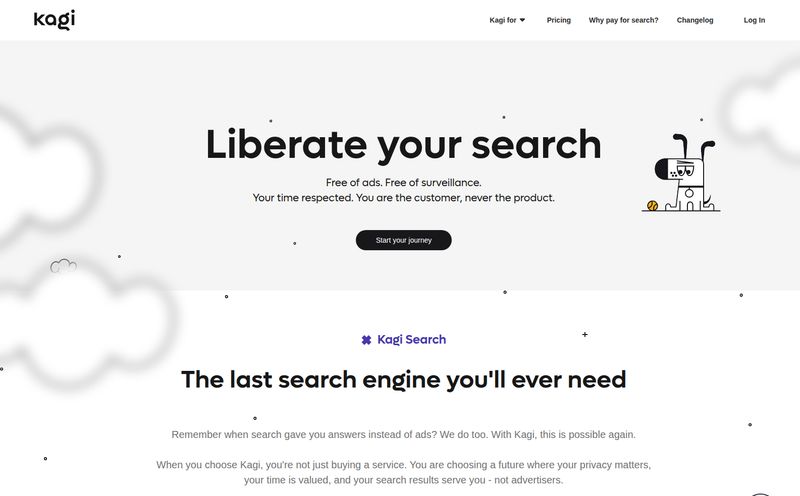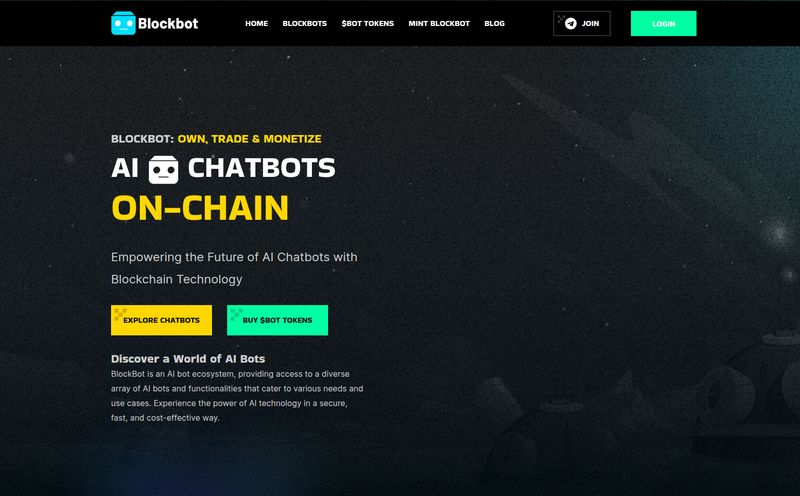I remember the all-nighters. You probably do too. Surrounded by a fortress of half-empty coffee mugs, with a dozen browser tabs open—one for the library database, one for a clunky citation generator, another for a thesaurus because you've used the word “important” seven times in one paragraph. The sheer stress of academic writing is a universal experience. It’s a rite of passage, but man, does it suck sometimes.
So when a tool like StudyPro pops up on my radar, claiming to be the "ultimate AI writing tool for academics," my inner SEO-nerd and former caffeine-fueled student both sit up and pay attention. The market is absolutely flooded with AI writers right now, each promising to change your life. But one built specifically for academic work? That’s a bit different. Let’s see if it’s just marketing fluff or the real deal.
So, What is StudyPro Anyway?
At its core, StudyPro is an AI-powered platform designed to be a student's sidekick. Think of it less as a ghostwriter that does the work for you, and more as a really, really smart co-pilot for your academic assignments. The homepage promises to take you from "draft to done, flawlessly." A bold claim. It’s not just a single-trick pony; it’s a whole suite of tools bundled together. We're talking AI writing assistance, a homework planner, a grammar checker that doesn't just flag squiggly red lines, a paraphraser, and a summarizer. The goal is pretty clear: to streamline the messy, often chaotic, process of studying and writing.
Breaking Down The StudyPro Toolkit
Alright, let's pop the hood and see what this thing is actually made of. A platform is only as good as its features, right? Here’s what StudyPro brings to the table.
The AI Writing Assistant
This is the headline act. The tool claims its AI is different because it's been trained specifically on academic papers and structures. This is a big deal. Generic AI can write a decent blog post, but it often stumbles on the rigid, formal, and citation-heavy style of academic work. StudyPro says it can help you structure arguments, refine your writing, and basically act as a brainstorming partner to get you past that dreaded blank page. I've always felt the hardest part is just starting, so a tool that helps you outline and draft could be a lifesaver.
The Paraphraser and Summarizer Combo
Here’s where things get interesting and a little tricky. The paraphraser is designed to help you reword sentences to avoid accidental plagiarism and improve your flow. The summarizer can take a dense, jargon-filled research paper and spit out the key points. In my experience, these are the tools that can either be incredibly useful or a complete waste of time. A good one helps you grasp complex ideas; a bad one just shuffles words around into a nonsensical salad. The key here is using it as a learning aid, not a crutch to just re-spin other people's work without understanding it.
Plagiarism and Grammar Checkers
Submitting a paper riddled with typos or, worse, unintentional plagiarism is every student’s nightmare. It’s like showing up to a job interview with a coffee stain on your shirt. StudyPro integrates these checkers directly into the workflow. The promise is to give you that "submit with confidence" feeling. It’s basically like having a grammar-obsessed librarian and a plagiarism-sniffing bloodhound all rolled into one digital package, constantly looking over your shoulder in a helpful, not-creepy, way.
The Underdog Feature: A Homework Planner
This was mentioned in some of the platform's material but isn't front-and-center on the homepage. But honestly? It might be one of the most practical tools. Juggling deadlines for five different classes is a nightmare. A smart planner that helps you map out your assignments, research time, and writing sessions could seriously reduce last-minute panic. It’s not as flashy as an AI writer, but it’s the kind of foundational tool that prevents the all-nighters in the first place.
Who Is This Tool Actually For?
The site calls out four main groups: Students, Researchers, Academics, and Educators. And it makes sense.
For a student, it’s about surviving the weekly onslaught of essays and reports. For a researcher or academic, it could be about speeding up the literature review process or polishing a manuscript for publication. And for an educator, it could be a tool to recommend to students who struggle with structure and grammar, helping them learn the ropes of academic convention. It's trying to be a one-stop-shop for anyone who has to write something that will eventually be graded or peer-reviewed.
The Elephant in the Room: The AI Ethics Debate
Okay, let's talk about it. Is using a tool like StudyPro cheating? Some might argue that relying on AI hinders the development of critical thinking and writing skills. And they have a point. If you just type a prompt and copy-paste the result, you’re not learning a thing. You're just... outsourcing your education.
"AI should be a tool for augmentation, not abdication. It should handle the tedious parts so you can focus on the thinking, the arguing, the creating."
However, in my experience, the conversation is more nuanced. We use calculators for math, spell checkers for writing, and search engines for research. Is an AI assistant that helps you structure a paragraph or find a better word really so different? I beleive the line is drawn at intent. If you use StudyPro to understand complex sources, organize your thoughts, and polish your prose, you’re using it as a powerful learning aid. If you use it to bypass the work entirely, you're only cheating yourself. The platform itself seems to lean towards the “co-pilot” model, helping you make your work better, not doing the work for you. It's a fine line to walk, and the responsibility ultimately falls on the user.
Let's Talk Money: The Pricing Situation
This is where things get a tad fuzzy. The homepage proudly states, "100% free, no credit card required." But right next to the login button, there's a big, shiny "Get free Premium" button. This usually signals a freemium model. My best guess? You get a certain amount of access for free—maybe a limited number of plagiarism checks or a cap on how many words the AI assistant will generate per day. The "Premium" version likely removes these caps and might add more advanced features. This is a pretty standard playbook for SaaS tools, and it's a good one. It lets you kick the tires and see if you even like the tool before commiting. I couldn't find a dedicated pricing page (in fact, the link seemed to be broken when I tried, oops!), so we'll have to wait for more clarity on what Premium actually costs, if anything.
Frequently Asked Questions About StudyPro
I dug through their site and pulled some of the most common questions people might have.
How can StudyPro assist me throughout the writing process?
It helps at every stage. It can brainstorm ideas and create outlines when you're stuck, assist with drafting paragraphs, help you rephrase sentences for clarity, and then run final checks for grammar and originality before you submit.
How is StudyPro's AI different from other tools?
The main differentiator is its specialization. While many AI tools are generalists, StudyPro's AI has been specifically trained on a massive library of academic texts. This means it should have a better grasp of the formal tone, complex structures, and citation requirements of academic writing.
Is StudyPro only for academic writing?
While that's its primary focus, the tools for grammar, paraphrasing, and summarizing are useful for almost any kind of writing. But its real power is definitely geared towards the academic world.
Can the tool help with citations?
The FAQ mentions the ability to "check content within tools," which implies it can handle citations. A good AI academic assistant absolutely needs a robust citation generator and checker, so this would be a critical feature to test out.
Will this make my writing sound robotic?
That's the risk with any AI writer. The best approach is to treat the AI's output as a first draft or a suggestion. Always go back and inject your own voice, perspective, and analysis. It's a starting point, not the final word.
Can I get in trouble for using this?
This depends entirely on your institution's academic integrity policy and how you use the tool. Using it to check grammar or organize your outline is almost certainly fine. Using it to write entire sections of your paper from a simple prompt could be considered academic misconduct. Always check your school's guidelines.
So, What's The Verdict on StudyPro?
I'm cautiously optimistic. In a sea of generic AI tools, a specialized platform like StudyPro has the potential to be genuinely useful. The biggest hurdle for most students isn't a lack of intelligence; it's a lack of confidence and a struggle with the sheer mechanics of academic writing. A tool that can help with organization, structure, and polishing could free up mental bandwidth for what really matters: the research and the critical thinking behind the words.
Is it a magic wand that will write your A+ paper for you? No. And it shouldn't be. But as an intelligent, always-on study buddy to help you navigate the trenches of academia? It just might be the co-pilot a lot of students have been waiting for.
References and Sources
- StudyPro Official Website
- AI and academic integrity: a nuanced discussion on tools in education - Nature.com
